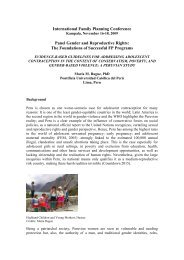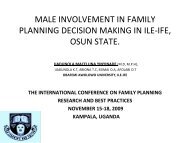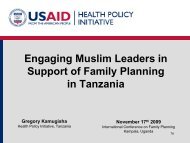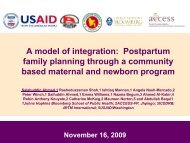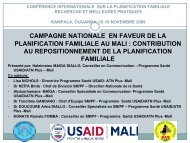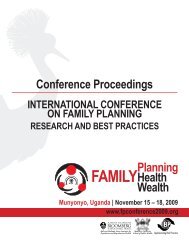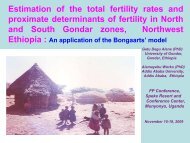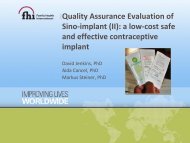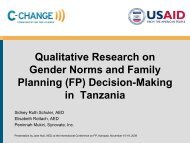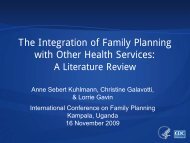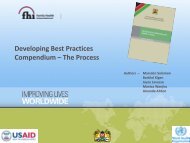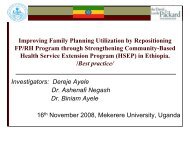Private Sector Franchising for Long Term Methods in Kenya
Private Sector Franchising for Long Term Methods in Kenya
Private Sector Franchising for Long Term Methods in Kenya
Create successful ePaper yourself
Turn your PDF publications into a flip-book with our unique Google optimized e-Paper software.
<strong>Private</strong> <strong>Sector</strong> <strong>Franchis<strong>in</strong>g</strong><br />
<strong>for</strong> <strong>Long</strong> <strong>Term</strong> <strong>Methods</strong> <strong>in</strong><br />
<strong>Kenya</strong><br />
By Veronica Musembi and Jennifer Kariuki
Overview of presentation<br />
• Background<br />
• PSI’s <strong>in</strong>tervention<br />
• Results<br />
• Successes<br />
• Challenges
Background<br />
- Use of <strong>Long</strong> term methods rema<strong>in</strong>s low relative to other<br />
methods - IUD used by 1.6%, Implants 1.9% among currently<br />
married women (prelim<strong>in</strong>ary KDHS 2008/9)<br />
- Low knowledge of FP methods esp. IUDs with no national FP<br />
communication<br />
- The private sector acts as a source of family plann<strong>in</strong>g to 41% of<br />
users<br />
- 51% of IUD and 39% of Implant users were supplied from<br />
private sector sources (2003 KDHS).<br />
- <strong>Private</strong> sector critical <strong>in</strong> <strong>in</strong>creas<strong>in</strong>g access but lack the<br />
necessary skills<br />
page 3
Percentage<br />
CPR and Unmet Need<br />
100<br />
90<br />
80<br />
70<br />
60<br />
50<br />
40<br />
30<br />
20<br />
10<br />
0<br />
60<br />
27<br />
36 24<br />
33<br />
39<br />
1989 1993 1998 2003 2008/9<br />
25<br />
41<br />
25<br />
46<br />
Unmet Need<br />
CPR
Trends <strong>in</strong> Use of Specific <strong>Methods</strong>, <strong>Kenya</strong><br />
1993 – 2008/9 (exclud<strong>in</strong>g northern districts)<br />
Percentage<br />
25<br />
20<br />
15<br />
10<br />
5<br />
0<br />
10 9<br />
8<br />
7<br />
4<br />
3<br />
3<br />
2<br />
15<br />
12<br />
7<br />
22<br />
Pill IUD Injectables Condoms Female<br />
Sterilization<br />
1993 1998 2003 2008/9<br />
1<br />
1<br />
1<br />
2<br />
6<br />
6 6 7<br />
5 5 4 5<br />
Periodic<br />
Abst<strong>in</strong>ence
FP issues and challenges <strong>in</strong> <strong>Kenya</strong> (Cont’d)<br />
• Inadequate FP tra<strong>in</strong><strong>in</strong>g and supervision <strong>for</strong> service<br />
providers<br />
• Inadequate capacity of facilities to provide quality FP<br />
services – <strong>in</strong>frastructure, equipment, adequately tra<strong>in</strong>ed<br />
personnel<br />
• Low level of <strong>in</strong>tegration of FP and HIV&AIDS services<br />
• Inadequate services target<strong>in</strong>g youth<br />
• HIV&AIDS epidemic<br />
Source: National RH Policy – Pg 13
PSI Strategy<br />
• Develop a private sector network of private providers<br />
identified with a common logo<br />
• Providers selected based on a m<strong>in</strong>imum standards<br />
criteria<br />
• Network promotes long term methods of FP<br />
especially IUDs and Implants and quality FP service<br />
provision<br />
• Network is composed of nurses and cl<strong>in</strong>ical officers<br />
who offer services to low <strong>in</strong>come populations<br />
• Providers sign agreement with PSI to adhere to<br />
quality service provision protocols & attend tra<strong>in</strong><strong>in</strong>g
Tunza Family Health Network Logo
Tunza Family Health Network<br />
• In December 2008, PSI<br />
mapped private facilities <strong>in</strong> 7<br />
regions of <strong>Kenya</strong><br />
• Selected 113 <strong>for</strong> the network.<br />
• Cl<strong>in</strong>ics signed MoU with PSI<br />
and paid small annual jo<strong>in</strong><strong>in</strong>g<br />
fee<br />
• PSI provided Contraceptive<br />
Update Tra<strong>in</strong><strong>in</strong>g with <strong>Kenya</strong><br />
Department of Reproductive<br />
Health<br />
• Tra<strong>in</strong><strong>in</strong>g <strong>in</strong>cludes 3 days<br />
theory and 2 days practicum<br />
<strong>in</strong> a cl<strong>in</strong>ical sett<strong>in</strong>g
What Tunza Cl<strong>in</strong>ics Receive<br />
• Tra<strong>in</strong><strong>in</strong>g (<strong>in</strong>itial certification and on-go<strong>in</strong>g updates)<br />
• Supportive supervision visits by PSI medical staff<br />
• Job Aids (e.g. Medical Eligibility Wheel, Global handbook <strong>for</strong> FP<br />
providers, check lists)<br />
• Publicity of Tunza cl<strong>in</strong>ics through Tunza events<br />
• Brand<strong>in</strong>g of the health facility with Tunza logo<br />
• Consistent supply of subsidized products (currently family<br />
plann<strong>in</strong>g products, but to <strong>in</strong>clude other health areas)<br />
• Initial set of IUD & Implant <strong>in</strong>sertion equipment and supplies<br />
• Cost shar<strong>in</strong>g subsidy to help clients pay <strong>for</strong> IUDs<br />
• Quarterly newsletter with contraceptive updates<br />
page 11
What Tunza Members Agree To<br />
• Provide family plann<strong>in</strong>g<br />
services, especially long-<br />
term methods<br />
• Submit data to PSI either<br />
through paper or SMS<br />
• Adhere to Quality Assurance<br />
Guidel<strong>in</strong>es<br />
1. Technical Competence<br />
2. Safety<br />
3. In<strong>for</strong>med Choice<br />
4. Privacy and Confidentiality<br />
5. Cont<strong>in</strong>uity of Care<br />
6. Quality/Consistency of Data
page 14
Results to Date<br />
• Tra<strong>in</strong>ed 113 <strong>Private</strong> Practitioners (CTU)<br />
• Conducted 2-day refresher course <strong>for</strong> 95 providers<br />
• Commenced brand<strong>in</strong>g of Network cl<strong>in</strong>ics<br />
• Total of 12,519 IUDs <strong>in</strong>serted to date<br />
• Total of 1,167 Implants <strong>in</strong>serted to date<br />
page 15
IUD <strong>in</strong>sertions by different strategies,<br />
life of project
Implant <strong>in</strong>sertions by different<br />
strategies, life of project
Successes of Model<br />
• Event Days<br />
– Opportunity <strong>for</strong> tra<strong>in</strong>ed providers to use their skills<br />
– Awareness of Tunza Network at community level<br />
• Tunza Mobilizers<br />
– Generat<strong>in</strong>g FP referrals <strong>in</strong>clud<strong>in</strong>g long term methods<br />
– Br<strong>in</strong>g<strong>in</strong>g together WRA as a group <strong>for</strong> educational sessions<br />
with PSI staff<br />
• Branded Network<br />
– Client now has relationship with this provider/cl<strong>in</strong>ic and can<br />
return <strong>for</strong> follow-up and other services<br />
page 18
Challenges<br />
• Buy-In/Engagement of Providers<br />
• Adequate supplies and <strong>in</strong>frastructure<br />
• Myths and misconceptions especially about IUDs<br />
• Record Keep<strong>in</strong>g among providers<br />
page 19
Acknowledgements<br />
<strong>Private</strong> Foundation<br />
M<strong>in</strong>istry of Health<br />
DRH



